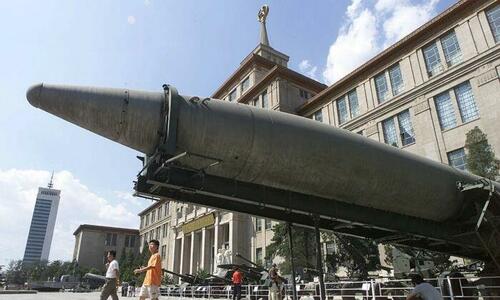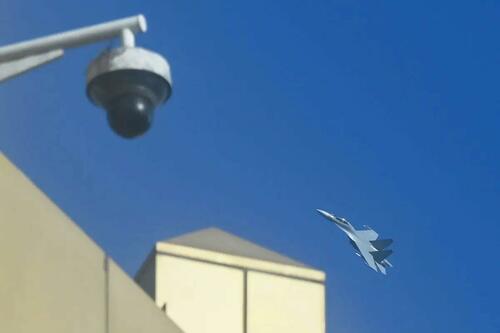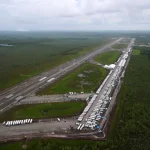
Authored by Dorothy Li and Jan Jekielek via The Epoch Times (emphasis ours),
The Chinese Communist Party has aggressively built up its military, expanding its arsenal of both conventional and nuclear capabilities. The growth was largely funded by its rival, the United States.

That is one of the arguments made by James Fanell, a retired U.S. Navy captain, and Bradley Thayer, a senior fellow at the Center for Security Policy, a Washington-based think tank, during a recent interview with EpochTV’s “American Though Leaders“ program.
“The Chinese Navy now is over 150 naval combatants greater than the U.S. Navy. They are now the largest navy in terms of numbers of hulls and tonnage,” said Mr. Fanell, also a former Director of Intelligence and Information Operations for the U.S. Pacific Fleet. “Over the last decade, they’ve produced more tonnage and battle force missiles. The Chinese have more anti-ship cruise, longer-range, supersonic missiles.”
“In just that one area of the navy, they’ve gone from being an inferior, coastal, brown water navy … to being a global navy.”
The naval forces’ development, according to Mr. Thayer, is “largely funded” by the United States.
“We did that. Wall Street and our investors gave them the money to grow their economy and to build the weapons to kill us,” he said.
But it’s not just happening with the Chinese navy. “Every aspect of its military growth, economic growth, diplomatic growth, science, technology, lunar exploration, and space exploration that we are witnessing is due to the Americans,” said Mr. Thayer, a contributor to The Epoch Times. “Its peer enemy funded it and allowed it to grow.”
To prevent the regime from rising, “the first rule of strategy is don’t assist your enemy,” said Mr. Thayer, co-author of the new book, “Embracing Communist China: America’s Greatest Strategic Failure.”
“Of course, we violated that time and time again.”
‘Imminent’ Threat’
The Chinese Communist Party (CCP) leader Xi Jinping has said the country’s armed forces will be brought to a “world-class” standard, capable of “fighting and winning wars” by mid-century, fueling concerns about a potential war with Taiwan and the United States.
Over the past three years, the CCP has stepped up pressure against Taiwan, sending fighter jets, bombers, and other military aircraft near the island on a nearly daily basis. U.S. military officials, lawmakers, and intelligence officers have suggested that the CCP is close to being ready for an invasion or blockable of Taiwan, a self-ruled island Beijing claims as its own territory.
The effects of a potential conflict would not be limited to Taiwan and its 23 million people, according to Mr. Fanell. The U.S. sailors, soldiers, marines, and airmen stationed over there would suffer too.
“They will be in the frag pattern if China decides to invade Taiwan,” he said, describing the threat from China as “imminent,” “real,” and “credible.”
Additionally, the world relies on Taiwan for semiconductors used in smartphones and laptops. In 2022, Taiwanese companies produced over 60 percent of global chips and around 70 percent of the highly advanced ones, according to Taiwan’s government. All of the chips under seven nanometers were manufactured by one company, the Taiwan Semiconductor Manufacturing Corporation.
If China takes over Taiwan, its chip factories could end up being controlled by the communist regime.
For people living on U.S. soil, “what does that mean to them when Taiwan falls and now all of a sudden computer chips and all that technology is in the hands of the Chinese Communist Party?” Mr. Fanell asked.
Were communist China to seize its democratic neighbor, another thing could happen to the U.S. economy: the CCP could interfere with the $5 trillion worth of global goods transiting through the South China Sea, he suggested.
“The Chinese will say, ‘We control who can come through because we’re the masters of the universe. If you’re not obeying us, your stuff cannot come through.”
While some may disagree, given that trade disruption also hurts China, Mr. Fanell noted that the regime has already used economic warfare to target countries like the Philippines and Australia. Norway also saw China freeze trade talks and impose a series of unofficial restrictions on Osclo’s fish exports in 2010 when the Norwegian Nobel Committee announced its decision to award the Nobel Peace Prize to an imprisoned Chinese dissident, Liu Xiaobao.
According to an estimate by CMI, a Noraway-based think tank, direct Norwegian fish exports to China were reduced by at least $125 million from 2010 to 2013.
“It doesn’t matter who it is or where it is. They will use economic warfare like a Navy ship would use a gun. They use it that way,” Mr. Fanell said.

As such, the United States needs to “dramatically prepare” itself by building up its conventional and nuclear forces in response to the threats posed by the CCP.
Nuclear Munitions
Mr. Fanell said America was the world’s top shipbuilder in the 1940s. In the past 80 years, however, U.S. shipbuilding accounted for less than 1 percent of the global share, according to United Nations data. In comparison, China produced 46 percent of the world’s commercial vessels in 2022, taking the number-one slot in terms of shipbuilding.
“We are in a mismatch in the ability to ramp up our military capabilities with the production of weaponry that we haven’t seen since before World War II.”
The preparation takes time, but the threat from China is imminent. Mr. Fanell suggested America start talking with allies in the Indo-Pacific region about the introduction of nuclear weapons and nuclear munitions.
“No one wants to use nuclear munitions. But in order to be able to have a deterrent effect on Xi and the Chinese Communist Party, we need to make them go back to their drawing board, go back to their comprehensive national power seminars and calculations, [and] say, ‘We didn’t think the Americans would do this. What are we going to do, and how do we have to adjust or delay our actions?’” said Mr. Fanell.
Over the past three years, China built 350 silos for intercontinental ballistic missiles (ICBM) in the central and western regions. According to Mr. Fanell’s assessment, these warheads are “very capable and operational.”
“We need to do what’s required to defend ourselves and our allies,” he said.
“Deterrence force is necessary to ensure that the Chinese cannot inflict total control over us and to do what they...want to do, which is to basically obliterate the American way of life.”
Despite the Chinese military’s buildup, Mr. Thayer remains confident in America, saying the country has great ideological strengths over the communist regime.
“Freedom is superior to tyranny,” Mr. Thayer said. Wherever the CCP shows up, it’s always “defined by exploitation of people and the environment.” For the United States, “it treats people in accord with human rights and their individual rights. That always makes us a better ally. ”
“We have great strengths, and they have great weaknesses. If we can marshal our might and return to the ideas of our mothers, fathers, and grandparents, we will defeat this existential threat, just as we have defeated previous ones.”
Authored by Dorothy Li and Jan Jekielek via The Epoch Times (emphasis ours),
The Chinese Communist Party has aggressively built up its military, expanding its arsenal of both conventional and nuclear capabilities. The growth was largely funded by its rival, the United States.

That is one of the arguments made by James Fanell, a retired U.S. Navy captain, and Bradley Thayer, a senior fellow at the Center for Security Policy, a Washington-based think tank, during a recent interview with EpochTV’s “American Though Leaders“ program.
“The Chinese Navy now is over 150 naval combatants greater than the U.S. Navy. They are now the largest navy in terms of numbers of hulls and tonnage,” said Mr. Fanell, also a former Director of Intelligence and Information Operations for the U.S. Pacific Fleet. “Over the last decade, they’ve produced more tonnage and battle force missiles. The Chinese have more anti-ship cruise, longer-range, supersonic missiles.”
“In just that one area of the navy, they’ve gone from being an inferior, coastal, brown water navy … to being a global navy.”
The naval forces’ development, according to Mr. Thayer, is “largely funded” by the United States.
“We did that. Wall Street and our investors gave them the money to grow their economy and to build the weapons to kill us,” he said.
But it’s not just happening with the Chinese navy. “Every aspect of its military growth, economic growth, diplomatic growth, science, technology, lunar exploration, and space exploration that we are witnessing is due to the Americans,” said Mr. Thayer, a contributor to The Epoch Times. “Its peer enemy funded it and allowed it to grow.”
To prevent the regime from rising, “the first rule of strategy is don’t assist your enemy,” said Mr. Thayer, co-author of the new book, “Embracing Communist China: America’s Greatest Strategic Failure.”
“Of course, we violated that time and time again.”
‘Imminent’ Threat’
The Chinese Communist Party (CCP) leader Xi Jinping has said the country’s armed forces will be brought to a “world-class” standard, capable of “fighting and winning wars” by mid-century, fueling concerns about a potential war with Taiwan and the United States.
Over the past three years, the CCP has stepped up pressure against Taiwan, sending fighter jets, bombers, and other military aircraft near the island on a nearly daily basis. U.S. military officials, lawmakers, and intelligence officers have suggested that the CCP is close to being ready for an invasion or blockable of Taiwan, a self-ruled island Beijing claims as its own territory.
The effects of a potential conflict would not be limited to Taiwan and its 23 million people, according to Mr. Fanell. The U.S. sailors, soldiers, marines, and airmen stationed over there would suffer too.
“They will be in the frag pattern if China decides to invade Taiwan,” he said, describing the threat from China as “imminent,” “real,” and “credible.”
Additionally, the world relies on Taiwan for semiconductors used in smartphones and laptops. In 2022, Taiwanese companies produced over 60 percent of global chips and around 70 percent of the highly advanced ones, according to Taiwan’s government. All of the chips under seven nanometers were manufactured by one company, the Taiwan Semiconductor Manufacturing Corporation.
If China takes over Taiwan, its chip factories could end up being controlled by the communist regime.
For people living on U.S. soil, “what does that mean to them when Taiwan falls and now all of a sudden computer chips and all that technology is in the hands of the Chinese Communist Party?” Mr. Fanell asked.
Were communist China to seize its democratic neighbor, another thing could happen to the U.S. economy: the CCP could interfere with the $5 trillion worth of global goods transiting through the South China Sea, he suggested.
“The Chinese will say, ‘We control who can come through because we’re the masters of the universe. If you’re not obeying us, your stuff cannot come through.”
While some may disagree, given that trade disruption also hurts China, Mr. Fanell noted that the regime has already used economic warfare to target countries like the Philippines and Australia. Norway also saw China freeze trade talks and impose a series of unofficial restrictions on Osclo’s fish exports in 2010 when the Norwegian Nobel Committee announced its decision to award the Nobel Peace Prize to an imprisoned Chinese dissident, Liu Xiaobao.
According to an estimate by CMI, a Noraway-based think tank, direct Norwegian fish exports to China were reduced by at least $125 million from 2010 to 2013.
“It doesn’t matter who it is or where it is. They will use economic warfare like a Navy ship would use a gun. They use it that way,” Mr. Fanell said.

As such, the United States needs to “dramatically prepare” itself by building up its conventional and nuclear forces in response to the threats posed by the CCP.
Nuclear Munitions
Mr. Fanell said America was the world’s top shipbuilder in the 1940s. In the past 80 years, however, U.S. shipbuilding accounted for less than 1 percent of the global share, according to United Nations data. In comparison, China produced 46 percent of the world’s commercial vessels in 2022, taking the number-one slot in terms of shipbuilding.
“We are in a mismatch in the ability to ramp up our military capabilities with the production of weaponry that we haven’t seen since before World War II.”
The preparation takes time, but the threat from China is imminent. Mr. Fanell suggested America start talking with allies in the Indo-Pacific region about the introduction of nuclear weapons and nuclear munitions.
“No one wants to use nuclear munitions. But in order to be able to have a deterrent effect on Xi and the Chinese Communist Party, we need to make them go back to their drawing board, go back to their comprehensive national power seminars and calculations, [and] say, ‘We didn’t think the Americans would do this. What are we going to do, and how do we have to adjust or delay our actions?’” said Mr. Fanell.
Over the past three years, China built 350 silos for intercontinental ballistic missiles (ICBM) in the central and western regions. According to Mr. Fanell’s assessment, these warheads are “very capable and operational.”
“We need to do what’s required to defend ourselves and our allies,” he said.
“Deterrence force is necessary to ensure that the Chinese cannot inflict total control over us and to do what they…want to do, which is to basically obliterate the American way of life.”
Despite the Chinese military’s buildup, Mr. Thayer remains confident in America, saying the country has great ideological strengths over the communist regime.
“Freedom is superior to tyranny,” Mr. Thayer said. Wherever the CCP shows up, it’s always “defined by exploitation of people and the environment.” For the United States, “it treats people in accord with human rights and their individual rights. That always makes us a better ally. ”
“We have great strengths, and they have great weaknesses. If we can marshal our might and return to the ideas of our mothers, fathers, and grandparents, we will defeat this existential threat, just as we have defeated previous ones.”
Loading…





